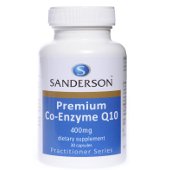Coenzyme Q10 or CoQ10 is also known, in its various forms, as ubiquinone, ubquinol, ubidecarenone and vitamin Q. It is present in every cell of the body and can be predominantly found in the mitochondria of each cell.
What is CoQ10? Forms of CoQ10 Benefits Side effects Prices are Inclusive of GST (sales Tax).
Page updated 06/04/18 12:47:36 p.m.
What is CoQ10?
A substance that the body can produce naturally, it is used by the cells to generate energy as well as functioning as a powerful antioxidant that helps in fighting free radicals. It is present in every cell of the body but mostly concentrated in the mitochondria of each cell. The liver and the heart cells have relatively more mitochondria therefore these organs contain more CoQ10 than other organs in the body.
Forms of CoQ10
There are 2 forms of CoQ10 - ubiquinol and ubiquinone.
Ubiquinone is the oxidized form of CoQ10 and it is also the more common and widely known commercially. When this form is taken, the body must convert it to ubiquinol.
Ubiquinol is the antioxidant form, it is the stronger form and is usually more expensive than the former. When this form performs its task in the body, it is reduced and becomes ubiquinone.
The amazing truth about these two forms is that the body knows what it needs and converts either of them accordingly.
What are the benefits of CoQ10?
- Plays major role in promoting heart health
- Helps increase energy levels
- Assists in enhancing the immune system
- Supports healthy gums
- Helps decrease some of the side effects associated with certain prescription drugs
- For women who are diagnosed with breast cancer, CoQ10 can help support the body in shrinking the tumours and reducing pain.
- For individuals who are suffering from neurodegenerative disorders such as Parkinson's, ALS and Alzheimer's, CoQ10 is a potential support for treatment.
What are the side effects?
A very common question is, can you take too much CoQ10? Just like any other supplements, it is always wise to adhere to the recommended daily dose so that you do not experience adverse side effects.
However, even on its recommended dosage, CoQ10 can have minor side effects. These vary from person to person depending on how the body reacts to this form of nutrient. Some of the recorded mild side effects are: stomach upset, loss of appetite, nausea, vomiting and diarrhea. Some people also experience skin rashes. It may also lower blood pressure so it is wise to check with your doctor it if you are suffering from very low blood pressure.
In order to reduce side effects it is wise to divide the total daily dose and take a smaller amount two to three times a day, instead of a large amount at once.
Page updated 06/04/18 12:47:36 p.m.






